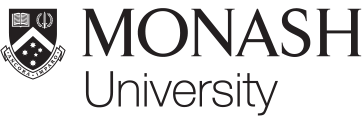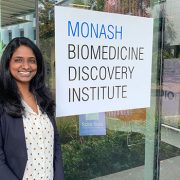Congrats Praveena on the award of the ARC DECRA
Monash BDI early career researchers awarded more than $2m ARC DECRA funding
Five Monash Biomedicine Discovery Institute (BDI) researchers have been awarded $2.23 million under the 2023 ARC Discovery Early Career Researcher Award (DECRA) scheme.
Minister for Education, Hon Jason Clare MP, announced $85 million for 200 projects nationwide to support early career researchers under the DECRA scheme.
Researchers at the Monash BDI received five awards to support a diverse range of discovery research into nanobiotechnology, bacterial membrane remodelling, microbial life in the atmosphere, lipid-mediated T cell immunity, and understanding how T cells recognise and respond to foreign antigens.
“This success is a testament to the depth of excellence in our early career researcher cohort, and I congratulate this outstanding group of recipients,” said Professor John Carroll, Director of the Monash BDI.
The grants awarded to the Monash BDI are:
Project: ‘Molecular insights into lipid-mediated T cell immunity.’ Dr Praveena Thirunavukkarasu, Rossjohn Lab, awarded $421,485
This project involves the discovery of novel lipids produced by the microbiome that play a significant role in T cell-mediated immunity. Using a combination of cutting-edge technologies such as mass spectrometry, protein crystallography, immunology and biophysics, this project will elucidate the molecular factors that govern the interaction between the identified lipids and T cells. This innovative research will provide fundamental insights into the recognition mechanism of lipids by T cells at a molecular level, thus broadening our knowledge in the field of biological sciences. The expected research outcomes will increase Australia’s international research standing in this burgeoning area of lipid-mediated T cell immunity.
Project: ‘A novel bacterial secretion system for applications in nanobiotechnology.’ Dr Christopher Stubenrauch, Lithgow Lab, awarded $429,449
This project aims to characterise a new molecular machine, called the S-Pump. Molecular machines drive the complex biology in all cells and are an exciting area of translational research, with broad potential for industrial applications. This project expects to provide fundamental insights into how bacterial S-Pumps contribute to antimicrobial resistance and enhancing food production. Expected outcomes include new tools for molecular machine discovery and identification of ways to adapt molecular machines for biotechnological applications. This work should enhance Australia-UK ties through collaboration, provide benefits toward nanobiotechnology and economic benefits through more efficient food production.
Project: ‘Bacterial membrane remodelling and the interaction with peptides.’ Dr Meiling Han, Jian Li Lab, awarded $450,241
This project aims to elucidate the fundamental mechanism of lipid remodelling in the Gram-negative outer membrane, which is critical both in preventing noxious compounds and evading host immune defence. For the first time, the complex interplay between bacterial cellular metabolism and membrane remodelling will be defined through systems pharmacology, and the precise membrane-peptide interaction will be examined by computational and biophysical approaches. Novel knowledge will be generated to improve our understanding of how bacteria remodel their outer membrane in response to environmental stress. This will benefit the future design of much-needed antimicrobial strategies including products and technologies to target bacterial membranes.
Project: ‘Microbial life in the atmosphere.’ Dr Rachael Lappan, Greening Lab, awarded $454,741
This project aims to resolve the nature and basis of microbial life in the atmosphere, the largest but most unexplored potential ecosystem on Earth. The atmosphere plays a role in transporting microbes, but our understanding of resident atmospheric microbial communities and their role in global atmospheric processes is minimal. Using cutting-edge molecular and biogeochemical approaches, this project aims to identify true microbial residents of the atmosphere, understand their mechanisms for survival in this environment and explore their role in seeding newly formed environments. The anticipated outcomes include fundamental knowledge on atmospheric microbial ecosystems, and their influence on global atmospheric processes.
Project: ‘Redefining how T cell recognition drives T cell activation.’ Dr Pirooz Zareie, La Gruta Lab, awarded $470,789
This proposal aims to define the key mechanisms that determine how T cells recognise and respond to foreign antigens; a critical feature that defines effective immunity. To achieve this goal, this proposal will leverage multidisciplinary collaborations and innovative methods to understand how structural and biochemical features of T cell receptor recognition influence T cell mediated immunity and development. In turn, this project will facilitate further research and development in the burgeoning field of T cell biology and advance life science research in Australia. Furthermore, as T cell biology is relevant to all vertebrates, this research will greatly benefit the conservation of threatened animal species and agriculture.
The DECRA scheme is designed to expand the knowledge base and research capacity in Australia and to provide economic, commercial, environmental, social and/or cultural benefits for Australia.
A full list of the 2023 ARC DECRA recipients and their projects is available on the ARC website.
Read the ARC Media Release announcing the DECRA scheme recipients on 16 September.
About the Monash Biomedicine Discovery Institute
Committed to making the discoveries that will relieve the future burden of disease, the Monash Biomedicine Discovery Institute (BDI) at Monash University brings together more than 120 internationally-renowned research teams. Spanning seven discovery programs across Cancer, Cardiovascular Disease, Development and Stem Cells, Infection, Immunity, Metabolism, Diabetes and Obesity, and Neuroscience, Monash BDI is one of the largest biomedical research institutes in Australia. Our researchers are supported by world-class technology and infrastructure, and partner with industry, clinicians and researchers internationally to enhance lives through discovery.
Also here




